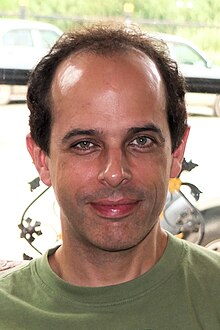David Germano | |
|---|---|
 | |
| Nationality | American |
| Citizenship | United States |
| Alma mater | University of Wisconsin–Madison |
| Known for | Tibetology |
| Scientific career | |
| Institutions | University of Virginia |
| Thesis | Poetic thought, the intelligent Universe, and the mystery self: The Tantric synthesis of Dzogchen (rdzogs-chen) in fourteenth century Tibet |
David Francis Germano is an American Tibetologist and professor of Tibetan and Buddhist Studies at the University of Virginia (UVA),[1] where he has dual appointments in its School of Nursing and Department of Religious Studies. Germano is a former board member of the International Association of Tibetan Studies, and currently serves as Editor-in-Chief for The Journal of the International Association of Tibetan Studies (JIATS),[2] a journal of Tibetology.
In 2000, Germano founded the Tibetan and Himalayan Library, a digital initiative for collaborative knowledge-building about the Tibetan and Himalayan regions. He has also served as its director since its inception.[citation needed] Germano has also been the co-director of the UVA Tibet Center since 2008.[3] At the University of Virginia, he is the founding director of both SHANTI (Sciences, Humanities, and the Arts Network of Technological Initiatives)[4] and the Contemplative Sciences Center.[5]
Germano received a Bachelor of Arts (BA) degree from the University of Notre Dame and later pursued his Doctor of Philosophy (PhD) at the University of Wisconsin–Madison, focusing on Buddhist Studies and Tibetan Studies.[1] Germano lived and studied in various regions of Asia for over a decade. His experiences included time in areas with dense population of Tibetans and other Himalayan Buddhists spanning Tibet, China, Bhutan, India, and Nepal.[6]
Germano's research focuses on philosophical and contemplative traditions in Tibet, with a particular emphasis on Dzogchen in the Nyingma and Bön traditions and Tibetan historical literature. He also investigates the contemporary state of Tibetan religion and its dynamic relationship with China.[1][7]